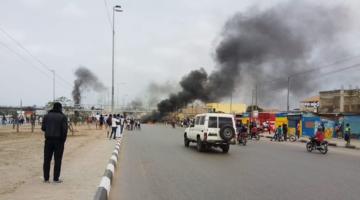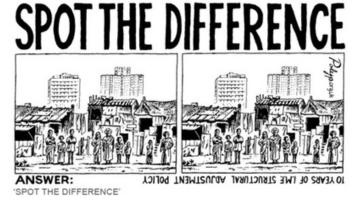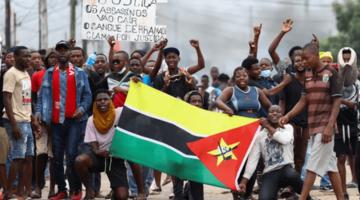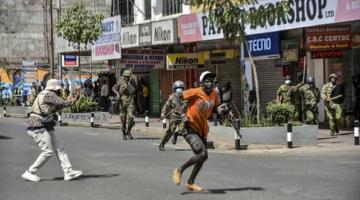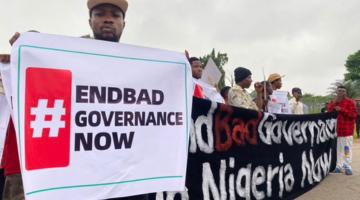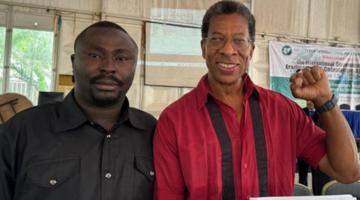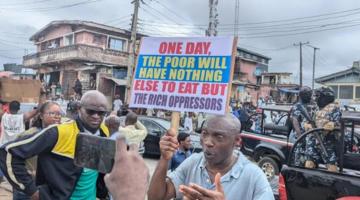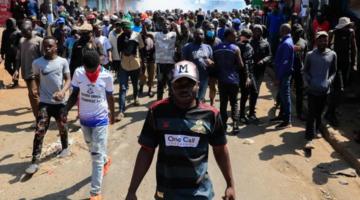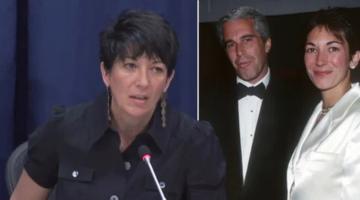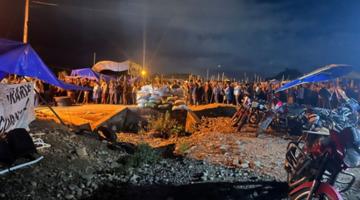Nigerian President Bola Ahmed Tinubu with IMF Managing Director, Kristalina Georgieva. Photo: Bola Ahmed Tinubu / X
After dozens died in stampedes, Nigerian President Bola Tinubu remarked, “We should just get on with it.” Tinubu’s IMF-prescribed policies have more than doubled food prices in the country, condemning millions more to hunger.
Originally published in People's Dispatch.
67 people, including 35 children and 22 women, were trampled to death in three separate stampedes that ensued in Nigeria as desperate crowds struggled to get their hands on a bag or two of groceries being distributed at Christmas charity events.
“Never before have there been so many people in Nigeria without food,” the UN World Food Program (WFP) stated in November 2024, noting that 25 million needed aid. UN agencies warned this number will increase in 2025 to 33 million, including 16 million children.
Acute malnutrition, which was affecting 4.4 million children as of April 2024, haunts another million children. “5.4 million children are now at risk of facing acute malnutrition by next April, a 25% increase” over a year, Save the Children said.
Of these 4.5 million, “about 1.8 million could be experiencing Severe Acute Malnutrition (SAM) – the deadliest form of malnutrition that compromises children’s immune systems and turns otherwise treatable illnesses, such as diarrhea, potentially lethal. This represents an alarming 80% increase in SAM cases.”
The first 5,000 children to come to the Christmas Funfair organized by a local radio station at a school in Oyo State’s capital Ibadan on December 18 were promised food parcels and cash. Thousands, including parents, slept the previous night outside the school gate. At dawn, 7,500 people were jostling to be the first 5,000 through the gate. In the aftermath of the stampede that followed, the bodies of 35 dead children were recovered.
22 women were crushed two days later on December 20 in another stampede in Okija town of Anambra State where a frenzied crowd struggled for bags of rice that were being handed out at the charity event organized by a businessman and philanthropist.
Earlier that morning, another ten lifeless bodies, including that of seven children, were on the ground alongside many other injured people screaming for help outside the Holy Trinity church in a posh neighborhood of Nigeria’s capital Abuja. 3,000 residents from nearby poor settlements had crowded outside the church before dawn to receive the parcels it was handing out.
“We should just get on with it”
“But things are improving; it doesn’t kill our happiness for this season… We should just get on with it,” remarked President Bola Tinubu during his “Presidential Media Chat”. Tinubu has overseen a 200% increase in food prices in less than two years of his rule.
“It is very sad that people are not well organized. We just have to be more disciplined in our society,” he added. “If you know you don’t have enough to give, don’t attempt to even give or publicize it,” he chided the organizers of the charity events, many of whom have been arrested.
“Stampedes at food distribution points are a metaphor for the… desperation that citizens have been thrown into,” said the Bishop of Sokoto Diocese, blaming the “failures of government to respond concretely toward ending the horrible crisis of hunger”.
A 50-kg bag of rice, Nigeria’s staple, has more than doubled since Tinubu took power in May 2023, costing over a hundred thousand Naira today – 30,000 more than the minimum wage of N70,000.
“The time for lamentation is over,” Tinubu declared on December 19 while presenting the 2025 budget in Nigeria’s parliament, barely 5 km from the Church outside which 10 were killed in the stampede the next morning. “This is a time to act.”
Asked what action he would take to check the rising prices of essentials, “We just continue to supply the market, we work hard to supply the market,” Tinubu replied. “I don’t believe in price control”.
IMF-prescribed Market Fundamentalism
His market fundamentalism has won much praise from the IMF, which had for long been calling on Africa’s largest producer of crude oil to remove the petroleum subsidies for its people, who constitute the continent’s largest population.
“The fuel subsidy is gone,” he declared in his inaugural speech on May 29, 2023, after winning a disputed election for which he had campaigned promising to slash petrol prices. He has presided over a nearly 500% increase in petrol prices since. The resulting increase in energy and transport costs shot up all prices, including that of food.
Only days after lifting fuel subsidies, Tinubu also kneecapped Nigeria’s ability to import food by ending government control over currency exchange rate and floating Naira, which has since lost over 70% of its value, dropping from about 461 per US dollar to around 1,550.
“President Tinubu has moved ahead with important structural reforms: removing fuel subsidies and unifying the various official foreign exchange windows,” praised the IMF. Noting with satisfaction that the central bank was demonstrating a “resolve by dropping its previous role in development finance,” its February 2024 assessment concluded that “Nigeria’s capacity to repay the Fund is adequate.”
True to its assessment, within a year of taking power, Tinubu had coughed up USD 1.22 billion for the IMF, in service of the USD 3.4 billion COVID “emergency loan” it had provided to Nigeria in 2020. By then, the World Bank approved a USD 2.25 billion loan, praising his reforms as the “initial critical steps to restore macroeconomic stability”.
With several other borrowings, the national debt under his watch rose by N24.33 trillion, over 14 billion in USD, reaching N121.67 trillion, almost USD 79 billion.
“I have no regret”
“Borrowing is not criminal,” Tinubu said at the press conference on December 23, arguing it was necessary to address the “serious infrastructural challenges.” But petrol subsidies amounted to “spending our future… spending our generation’s fortune,” he insisted.
“I have no regret removing petrol subsidy,” which, according to a study published in the Central Bank of Nigeria’s quarterly journal, has been the main driver of food price inflation.
Resulting hunger has not spared the members of his own party, one of whom was among the seven killed in the stampede in February 2024 in Nigeria’s commercial hub Lagos, where the Customs Service was selling rice bags confiscated from smugglers at a discounted price.
By then, 100 million people, 45% of the population, were experiencing varying degrees of food insecurity, up from 66 million last year. The WFP had warned that 18.6 million of them were suffering acute hunger while 43.7 million were coping with hunger levels at or above its benchmark for classification as “crisis”.
In a wave of incidents over March and April, desperate residents broke into warehouses and blocked highways to hold up trucks to loot rice bags.
Extrajudicial executions, mass arrests, custodial torture and charges of treason were all used to crackdown on the hunger protests, organized by civil society organizations from August 1-10, demanding a reinstatement of petrol subsidies and regulation of Naira’s exchange rate.
In the face of these hunger-driven protests, looting and stampedes, Tinubu has remained unfazed. “The time for lamentation is over. This is a time to act. A time to support and promote greater investment in the private sector,” he announced in his parliamentary speech, presenting “an ambitious but necessary budget”, a third of which will go toward servicing debt he continues to accumulate, even as millions more join Nigeria’s hungry population.

